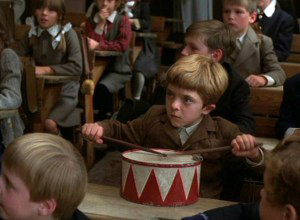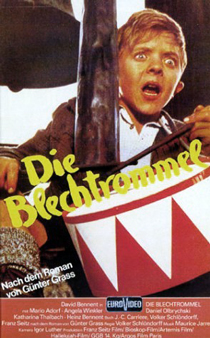
 |
|
|
|
Criterion released its first DVD of Volker Schlöndorff's The Tin Drum back in 2004, to general acclaim. Eleven years later, its director has undertaken a thorough restoration job. The new Blu-ray upgrade offers 21 additional minutes as well as new extras. The Tin Drum is a challenging and disturbing adaptation of a widely-celebrated novel that at first glance wouldn't appear to lend itself to a film adaptation. Volker Schlöndorff is perhaps the most profound of the young German directors who rose in the 1970s, and his brilliant movie is artistically fascinating. This is one show that pleases fans of the original book. 
The tale of a self-willed freak's odd adventures across traumatic decades of German history is completely original, and free of judgmental moralizing or after-the-fact solutions. The film's style could almost be called Magical Realism, if it weren't for the nagging suspicion that something terrible is about to happen at any moment. The Nazi years are treated as a malignant fairy tale experienced through the eyes of child who sees things as they are, without the filters of adult prejudice. The story invents a strange character as a way of establishing a consistent viewpoint through terrible times. Young Oskar Matzerath (David Bennent) is so traumatized by the adult madness around him that he wills himself to stop growing at the age of 3. He's inseparable from his toy drum, and when he screams his voice shatters glass. Oskar's mother (Angela Winkler) and his two fathers (?) Alfred Matzerath (Mario Adorf) and Jan Bronski (Daniel Olbrychski of Les uns et les autres) manage to survive the years of Nazidom and the bizarre events of the war. Befriending a troupe of performing midgets, Oskar travels to the Western front to entertain the German troops. Director Schlöndorff's biggest achievement in The Tin Drum is the way it expresses the story's fantastic elements with what are basically simple effects. A voice that shatters objects of glass is easy enough, but we also bear witness to a number of other bizarre happenings, including a vision of life inside a womb. Oskar Matzerath's strange experience is always slightly distorted. The political perversity of life under the Nazis is sometimes expressed through scenes of disturbing sexuality. Oskar narrates the film as if he were the spirit of his country. He's a child of stunted spirit who lives in terror and faces life in a state of uncommunicative apprehension. He's acutely aware that the man whose name he bears may not be his real father. His mother Agnes still slips away for clandestine meetings with Jan Bronski. Oskar hides under his grandmother's skirts in the same way his grandfather did, unavoidably implying a sexual relationship, if only in a conceptual sense. 
The marching Nazis are first seen being pelted and jeered by scornful crowds. By the time of the war Danzig is accepted as a fundamentally German town. Poles and Jews are persecuted on the streets. The Jews are hounded out by both Poles and Germans, as seen in the casual harassment of the sensitive toy-seller Sigismund Markus (Charles Aznavour, in a touching performance). The local communist (Wings of Desire's Otto Sander) takes pride in being a convert to Naziism, in the foolish notion that Hitler must have a special love for a prodigal son. Oskar's father Alfred becomes a party member as a matter of self-image, something he can't impart to his drum-rattling, glass-shattering son. Key scenes show Oskar interrupting a parade and ruining a big Nazi rally via the interference of his little drum. Led by his strange cadence, the regimented files of men and women break ranks to waltz instead of shouting, "Seig Heil." The unsettling nature of The Tin Drum is more a matter of tone than any graphic presentation. Unbalanced by either sex or the insanity of life, Oskar's mother starts eating fish -- whole fish, head first -- without any camera tricks. It's a difficult sight not to wince at. Little Oskar has the body of a 3 year-old, but he's chronologically a teenager when he has a quasi-affair with Maria, his very young-looking stepmother. This is the content that got the film in trouble with some troublesome bluenoses in Oklahoma. It is disturbing, not because anything too explicit happens but simply because an obvious child is involved. Oskar's adventures become more satirical when he joins the little entertainment troupe. He wears a tiny uniform and performs for the German soldiers. There he meets his closest love, an Italian midget. He then returns to a blasted Danzig, to once again become a refugee. How this strange stack of bizarre elements congeals into a lucid portrait of an era is the mark of the genius of Günter Grass. The Tin Drum is a poetic interpretation of history, but it definitely captures an essence. Schlöndorff's presentation is splendid and his direction achieves a period believability without resorting to huge sets or (with one or two exceptions) large crowds of extras. The art direction and designs evoke a dark, rich and potentially happy Danzig. The evil seems sourced in some innate sin borne by the characters themselves. 
The casting is superb. Little David Bennent has a pained expression in his eyes that reminds of Oskar Werner or Anthony Hopkins. He seems older than his years, making his precocious tot character all the more weird. Mario Adorf and Daniel Olbrychski are very good and Angela Winkler is excellent as the emotionally misaligned mother. Katharina Thalbach is a Lolita-ish mystery as the sexually provocative stepmother.. leading Oskar into bizarre adventures that adhere to no known rules of conduct. The Tin Drum moves briskly and seems to end too soon, which is a high compliment for a pedigreed art film. Volker Schlöndorff does Germany right, advancing the national cinema while confronting its despairing past. Criterion's Blu-ray of The Tin Drum restores Volker Schlöndorff's full cut, which in 1979 was left behind when the film's distributors pressed for a contractually agreed-on shorter running time. The additional scenes expand and flesh out the film's themes. Criterion's presentation is quite good, even though sharp viewers will notice a slight degradation in image quality when the "new" material comes up. Criterion has dropped three extras from 2004 -- the isolated music track, the Volker Schlöndorff commentary and a featurette docu about the film's controversial censor troubles in Oklahoma. A new 70-minute Schlöndorff interview covers both the censorship squabble and the restoration of the long cut. Also new is an admiring look at the film by Timothy Corrigan. Repeating from the earlier disc are a recording of Günter Grass reading from his novel, a trailer, and archived interviews with Schlöndorff, Grass, writer Jean-Claude Carrière and actors David Bennent and Mario Adorf. The insert booklet essay by Geoffrey Mcnab is followed by the author's own words on the adaptation of his novel.
On a scale of Excellent, Good, Fair, and Poor,
The Tin Drum Blu-ray rates:
Reviews on the Savant main site have additional credits information and are often updated and annotated with reader input and graphics. Also, don't forget the 2011 Savant Wish List. T'was Ever Thus.
Review Staff | About DVD Talk | Newsletter Subscribe | Join DVD Talk Forum |
| ||||||||||||||||||